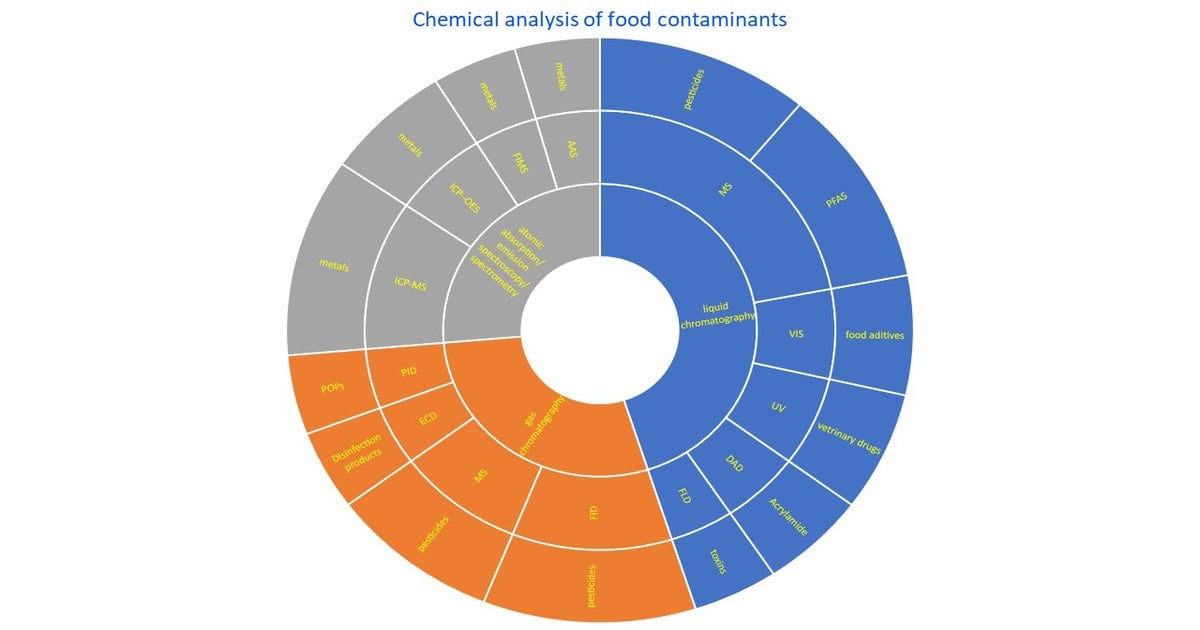Monitoring and Chemical Analysis of Food Contaminants
A special issue of Processes (ISSN 2227-9717). This special issue belongs to the section "Food Process Engineering".
Deadline for manuscript submissions: closed (15 March 2025) | Viewed by 1482

Special Issue Editors
Interests: instrumental analyses of pesticides; metals; mycotoxins; plant toxins; POPs; veterinary drugs
Interests: analytical chemistry; analytical toxicology; chromatography; separation techniques; immunochemical assays
Special Issues, Collections and Topics in MDPI journals
Interests: analysis of milk and dairy products; contamination; cheese production technology; adulteration of milk and dairy products; food quality control; validation and verification of analytical methods
Special Issue Information
Dear Colleagues,
Food safety and quality are the main public health concerns, making the monitoring and chemical analysis of food contaminants a significant issue. Contamination can occur during any step of the food chain, from farm to fork (growing and raising, manufacturing and processing, transport, preparation, and storage). Contaminants can enter the food intentionally or unintentionally, through environmental pollution or food protection measures or during industrial preparation and processing. The analysis of food contaminants can be carried out using various instrumental techniques.
The topics covered in this Special Issue include, but are not limited to, methods and applications in the following areas:
- Environmental pollution;
- Toxic metals;
- Polychlorinated biphenyls;
- Polychlorinated dioxins and furans;
- Pesticides;
- Veterinary drugs;
- Mycotoxins and plant toxins;
- Additives;
- PFAS;
- Disinfection products;
- Acrylamide;
- Instrumental analyses.
Thank you for your attention. We hope that you will consider participating in this Special Issue.
Dr. Adela Krivohlavek
Prof. Dr. Ivone Jakasa
Dr. Nataša Mikulec
Guest Editors
Manuscript Submission Information
Manuscripts should be submitted online at www.mdpi.com by registering and logging in to this website. Once you are registered, click here to go to the submission form. Manuscripts can be submitted until the deadline. All submissions that pass pre-check are peer-reviewed. Accepted papers will be published continuously in the journal (as soon as accepted) and will be listed together on the special issue website. Research articles, review articles as well as short communications are invited. For planned papers, a title and short abstract (about 100 words) can be sent to the Editorial Office for announcement on this website.
Submitted manuscripts should not have been published previously, nor be under consideration for publication elsewhere (except conference proceedings papers). All manuscripts are thoroughly refereed through a single-blind peer-review process. A guide for authors and other relevant information for submission of manuscripts is available on the Instructions for Authors page. Processes is an international peer-reviewed open access monthly journal published by MDPI.
Please visit the Instructions for Authors page before submitting a manuscript. The Article Processing Charge (APC) for publication in this open access journal is 2400 CHF (Swiss Francs). Submitted papers should be well formatted and use good English. Authors may use MDPI's English editing service prior to publication or during author revisions.
Keywords
- metals
- pesticides
- veterinary drugs
- mycotoxins
- plant toxins
- instrumental analysis
- monitoring
Benefits of Publishing in a Special Issue
- Ease of navigation: Grouping papers by topic helps scholars navigate broad scope journals more efficiently.
- Greater discoverability: Special Issues support the reach and impact of scientific research. Articles in Special Issues are more discoverable and cited more frequently.
- Expansion of research network: Special Issues facilitate connections among authors, fostering scientific collaborations.
- External promotion: Articles in Special Issues are often promoted through the journal's social media, increasing their visibility.
- Reprint: MDPI Books provides the opportunity to republish successful Special Issues in book format, both online and in print.
Further information on MDPI's Special Issue policies can be found here.







